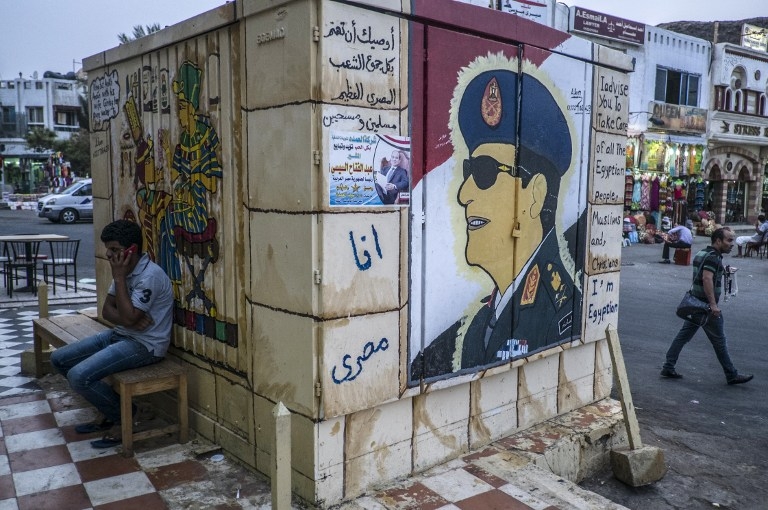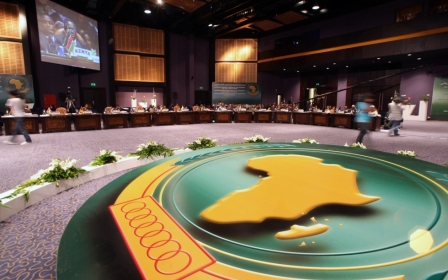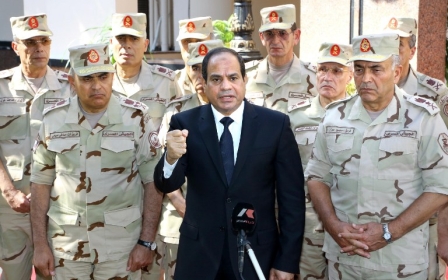Egypt conference to focus on economy, Sisi's reputation

Egypt is set to host a foreign investor conference on Friday, a conference it hopes will jump-start its battered economy while showcasing international support for President Abdel Fattah al-Sisi as he increasingly battles militants.
Sisi, a former army chief voted into office after toppling his predecessor Mohamed Morsi, has positioned himself as a frontline ally in the regional fight against militants, arguing that his country deserves more international support.
"The international economic conference is a reflection of the determination of Egypt and the Egyptians," he told Fox News in an interview broadcast on Monday.
"If Egypt is stable - a country of 90 million people - this will represent the strongest bedrock of stability in this region," he said, according to an English translation of his comments.
The three-day conference has been in the works for months, even as the government tries to stamp out an insurgency in the northern Sinai Peninsula and small-scale bomb attacks in Cairo that have targeted police and foreign companies.
US Secretary of State John Kerry, British Foreign Secretary Philip Hammond and several European finance ministers will attend the gathering at the Red Sea resort of Sharm el-Sheikh.
"For Egypt this is not an economic event, but rather a political one," one Western diplomat told AFP, speaking on condition of anonymity.
"The level of political representation of Western countries will be scrutinised" by Cairo, he said.
Call for unity
The conference comes at a time when Washington, which initially shunned Sisi over his deadly repression of Morsi's Muslim Brotherhood, has been forced to admit that it cannot isolate the biggest military force in the Arab world as the extremist Islamic State group gains ground in the region.
Sisi has called for a unified Arab force to fight IS, which has seized territory in Iraq and Syria, and Washington said Kerry and Sisi would meet on the sidelines of the conference to discuss a US-led coalition's air campaign against IS.
Sisi is preparing to issue a new investment law removing obstacles to foreign investment, which has declined since a 2011 popular uprising overthrew president Hosni Mubarak.
But the government has yet to find a way to end the now almost daily bombings in Cairo and elsewhere, undermining its message of restored stability.
The authorities blame the outlawed Muslim Brotherhood, and accuse it of trying to sabotage the conference.
A government crackdown on Morsi supporters since his overthrow has resulted in hundreds of deaths and thousands of people imprisoned.
An attack at Sharm el-Sheikh was unlikely "given the tight security measures", the Western diplomat said, but an incident elsewhere in Egypt would be equally damaging.
"On one side it would attract the media's attention, overshadow the conference, and would send a message contradicting the one Egypt aims to send in the conference, which is the return of peace and stability," he said.
Proving a point
"Officials want to make the event the focus of the media to prove to the world that the country is back on the international scene, and that it is safe and ready to receive investors and international economic and political figures."
Eighty countries and 23 regional and international organisations are due to attend, but several officials have sought to lower expectations, saying that no major contracts would be signed.
"The aim is to put Egypt back on the map of international investment, and send a message to the world that the country is safe and attractive," International Cooperation Minister Naglaa al-Ahwani said.
Projects in energy, transport, industry, telecommunications and housing will be offered for foreign investment.
"More than 30 projects will be unveiled, which can attract billions of dollars of investment," conference co-organiser economic consultant Richard Attias told AFP.
General Electric, Unilever, British Petroleum, ENI and HSBC are among the conglomerates attending.
To win investor confidence, the authorities plan to continue cutting fuel subsidies, which before the 2011 revolt accounted for 25 percent of the budget.
Egypt is aiming for economic growth of 4.3 percent in 2015-2016, compared with two percent annually since the anti-Mubarak uprising.
The government also aims to cut the budget deficit to 10 percent from 12.8 percent by next year, and reduce unemployment to 12 percent from 13.1 percent.
Egyptian economist Ziad Bahaa-Eldin weighed in on the conference in the el-Shorouq newspaper on Tuesday.
"The conference should not only showcase investment and business opportunities," Bahaa-Eldin wrote.
"Instead, the government should seize the chance to outline its medium and long-term economic policy, especially in regard to the budget deficit, prices, the currency market, the tax regime, public spending priorities, the state’s role in economic activity, and the growing unemployment."
He added that the Egyptian government needed to clarify its social policy at the conference.
"Before the January revolution, Egypt successfully improved national economic indicators, increased growth, employment, and currency reserves, opened new fields to foreign investment, and raised the country’s credit rating. But in the absence of a clear social policy and instruments to fairly distribute the fruits of growth, the poverty rate increased, public services collapsed, and income, opportunities, and resources become more inequitably distributed."
New MEE newsletter: Jerusalem Dispatch
Sign up to get the latest insights and analysis on Israel-Palestine, alongside Turkey Unpacked and other MEE newsletters
Middle East Eye delivers independent and unrivalled coverage and analysis of the Middle East, North Africa and beyond. To learn more about republishing this content and the associated fees, please fill out this form. More about MEE can be found here.




